What Does The Bible Say About The Burning of Bodies?
There’s a story in 1 Samuel chapter 31 about how King Saul, the first King of Israel, and his three sons were all killed in a battle with the Philistines. And the Philistines, being a ruthless and godless people, found the body of Saul, and they beheaded it and fastened the body to a wall. I suppose it was done to “taunt” the nation of Israel. V’s 9-10.
Then we’re told about the response of some of the people of Israel. It says in V’s 11-13, “Now when the inhabitants of Jabesh-gilead heard of what the Philistines had done to Saul, all the valiant men rose and walked all night, and took the body of Saul and the bodies of his sons from the wall of Beth-shan, and they came to Jabesh, and burned them there. And they took their bones and buried them under the tamarisk tree at Jabesh, and fasted seven days.”
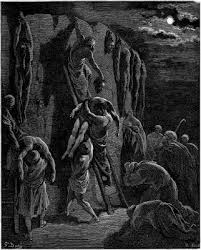 Now we’re not told why the people burned the bodies of Saul and his sons, and then buried the bones that remained. Why didn’t they just bury the bodies to begin with? The scriptures don’t give us the answer to that question, but there was no condemnation given for burning the bodies either. So we have to conclude that God didn’t object to the burning of the bodies of Saul and his sons. The Philistines were ridiculing Israel with their treatment of those bodies, and the Israelites were ending the ridicule and properly disposing of the bodies.
Now we’re not told why the people burned the bodies of Saul and his sons, and then buried the bones that remained. Why didn’t they just bury the bodies to begin with? The scriptures don’t give us the answer to that question, but there was no condemnation given for burning the bodies either. So we have to conclude that God didn’t object to the burning of the bodies of Saul and his sons. The Philistines were ridiculing Israel with their treatment of those bodies, and the Israelites were ending the ridicule and properly disposing of the bodies.
But here’s another story that tells of the burning of dead bodies for a seemingly different reason. In Joshua chapter 6, we read about the fall of the city of Jericho to the men of Israel. And God had told Israel that certain things from the city were banned from them to take for their own possession. Here’s what it says in V-19, “But all the silver and gold, and articles of bronze and iron are holy to the Lord; they shall go into the treasury of the Lord.”
But as it turned out, a man named Achan took for himself some of these articles and he hid them in his household. And it says in Joshua 7:1, “..and the anger of the Lord burned against the sons of Israel.”
Well, Joshua made a careful search, and found out that it was Achan who had taken the articles that were banned. Let’s look at what it says in verses 22-26..
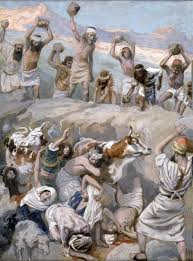 “So Joshua sent messengers, and they ran to the tent, and behold, it was concealed in his tent with the silver underneath it. And they took them from inside the tent, and brought them to Joshua and to all the sons of Israel, and they poured them out before the Lord. Then Joshua and all Israel with him, took Achan the son of Zerah, the silver, the mantle, the bar of gold, his sons, his daughters, his oxen, his donkeys, his sheep, his tent and all that belonged to him, and they brought them up to the valley of Achor. And Joshua said; Why have you troubled us? The Lord will trouble you this day. And all Israel stoned them with stones, and they burned them with fire, after they stoned them with stones. And they raised over him a great heap of stones that stands to this day, and the Lord turned from the fierceness of His anger. Therefore the name of that place has been called the valley of Achor to this day.”
“So Joshua sent messengers, and they ran to the tent, and behold, it was concealed in his tent with the silver underneath it. And they took them from inside the tent, and brought them to Joshua and to all the sons of Israel, and they poured them out before the Lord. Then Joshua and all Israel with him, took Achan the son of Zerah, the silver, the mantle, the bar of gold, his sons, his daughters, his oxen, his donkeys, his sheep, his tent and all that belonged to him, and they brought them up to the valley of Achor. And Joshua said; Why have you troubled us? The Lord will trouble you this day. And all Israel stoned them with stones, and they burned them with fire, after they stoned them with stones. And they raised over him a great heap of stones that stands to this day, and the Lord turned from the fierceness of His anger. Therefore the name of that place has been called the valley of Achor to this day.”
Just a note of interest here.. The word Achor literally means, “to set for yourself”. When Achan stole the silver and gold from the spoils of the city of Jericho, he was “setting for himself” riches, for him and his household. And we must assume that the rest of the people in his household knew about the buried riches, because ALL of his household was stoned and burned along with Achan.
Now it seems that we should conclude that the burning of these bodies was a show of disrespect for what these people had done. Joshua and all the others could have simply stoned them and then buried their bodies. But they choose instead to burn the bodies that they had already stoned to death.
Why did Israel burn those bodies? And why did Israel burn the bodies of Saul and his sons? It would seem that the burning of the bodies in these two incidents were for two different reasons. It’s obvious that the people had disrespect for what Achan had done in stealing riches that were supposed to go to God. But why were the bodies of Saul and his sons burned? It would seem that the people of Israel were ending the mistreatment by the Philistines. Of course the reality of the situation is that the whole reason that God gave Saul and his armies over to his enemy to be defeated was that Saul had already turned his back on God. And so God had rejected Saul as king of Israel. Could this be the reason for the burning of their bodies?
Unfortunately, the bible doesn’t give us the answers to those questions. What we DO know is that even in these two cases where bodies were burned, the remains were still buried afterwards. The bones of Saul and his two sons were buried, and the remains of Achan and his household were covered by a heap of stones.
There are many cases of God Himself sending fire down from heaven to consume those who had sinned against Him. The first instance of this was in the case of Sodom and Gomorrah and the other “cities of the plain”.
It says in Genesis 19:24, “Then the Lord rained on Sodom and Gomorrah brimstone and fire from the Lord out of heaven, and He overthrew those cities and all the valley, and all the inhabitants of the cities, and what grew on the ground.”
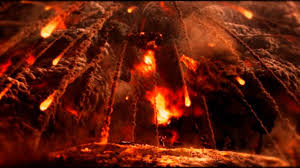
The second time that fire was used by God to execute judgment on people was in Egypt when Pharaoh wouldn’t let Israel go free. This time, fire was mixed with hail! Wouldn’t that be a wondrous sight!
We read in Exodus 9:23, “And Moses stretched out his staff toward the sky, and the Lord sent thunder and hail, and fire ran down to the earth, and the Lord rained hail on the land of Egypt.”
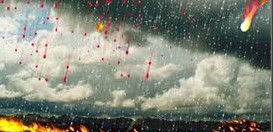
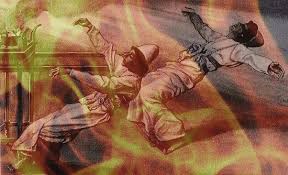 Then we have the story of Nadab and Abihu who were sons of Aaron the high priest, who presumptuously made an offering to God which they had no rite to offer. And the result was given in Leviticus 10:2, “And fire came out from the presence of the Lord and consumed them, and they died before the Lord.” But even in this case, the remains of the bodies were then taken outside the camp of Israel to be disposed of. V’s 4-5.
Then we have the story of Nadab and Abihu who were sons of Aaron the high priest, who presumptuously made an offering to God which they had no rite to offer. And the result was given in Leviticus 10:2, “And fire came out from the presence of the Lord and consumed them, and they died before the Lord.” But even in this case, the remains of the bodies were then taken outside the camp of Israel to be disposed of. V’s 4-5.
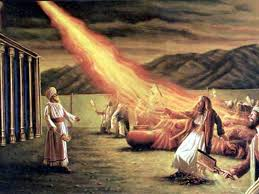 We also have a story about 250 Israelite men who were offering incense during a rebellion of the people towards Moses. And we read in Numbers 16:35, “Fire also came forth from the Lord and consumed the 250 men who were offering the incense.”
We also have a story about 250 Israelite men who were offering incense during a rebellion of the people towards Moses. And we read in Numbers 16:35, “Fire also came forth from the Lord and consumed the 250 men who were offering the incense.”
There’s many more examples of fire from God, used to execute judgment upon disobedient people. But realize that these are not examples of cremation, but rather are examples of God’s judgment. In most cases, it is specified that the remains were still buried.
There’s another very interesting statement made in the bible that could have a bearing on all of this also, depending upon how you view the statement. God Himself makes this statement in Amos 2:1. “Thus says the Lord; For three transgressions of Moab, and for four, I will NOT revoke it’s punishment; Because he burned the bones of the king of Edom to lime.” So I will send fire upon Moab, and it will consume the citadels of Kerioth, and Moab will die amid the tumult, with shouts and the sound of a trumpet.”
In chapters 1 and 2 of Amos, God was pronouncing His judgment upon eight cities and countries that refused to follow God’s will. Here’s a list of those cities/and or countries that God mentions, along with their specified sin..
“Damascus, because they threshed Gilead with implements of sharp iron.. Gaza, because they deported an entire population.. Tyre, because they delivered up an entire population to Edom.. Edom, because he pursued his brother with the sword.. Ammon, because they ripped open the pregnant women of Gilead in order to enlarge their borders.. Moab, because he burned the bones of the king of Edom to lime.. Judah, because they rejected the law of the Lord.. Israel, because they sell the righteous for money, and the needy for a pair of sandals.”
Now, we don’t have the time in this article to explain what all those “reasons” entailed and the exact meaning of them all, but it’s sufficient to say that all eight of the reasons given for God’s judgment, were things that obviously were wrong in God’s eyes. And one of those “wrong things” was to “burn the bones of the king of Edom”. We need to ask though; Why was it wrong to burn the king’s bones? Was it wrong because it’s an overall principle of God, that it’s wrong to burn the bones of anyone? Or was it wrong because it was such a disgraceful thing was done to the king of Edom, out of hatred? The bible doesn’t tell us any more about this event, but we do know that God condemned it. (some commentators have fanciful stories associated with this event, but God is silent about any more details)
Another Example
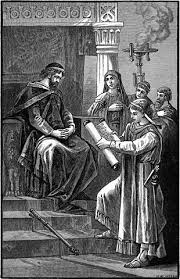 Here’s one more example from 2 Kings chapter 23. Israel and Judah had forsaken God! They had built high places of worship to false gods, they had built alters of stone, and had fashioned idols of wood. Then Josiah, king of Judah, after reading for himself, the book of the covenant of God (God’s word to Israel) made the decision to bring Judah back to God. He broke down all the high places of worship to other gods, he tore down the alters.
Here’s one more example from 2 Kings chapter 23. Israel and Judah had forsaken God! They had built high places of worship to false gods, they had built alters of stone, and had fashioned idols of wood. Then Josiah, king of Judah, after reading for himself, the book of the covenant of God (God’s word to Israel) made the decision to bring Judah back to God. He broke down all the high places of worship to other gods, he tore down the alters. 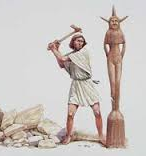
Listen to verse 15, “Furthermore, the alter that was at Bethel and the high place which Jeroboam had made, the son of Nebat who made Israel sin, even that alter and the high place he broke down. Then he demplished it’s stones and ground them to dust and burned the Asherah.” (an Asherah was a figure of a woman as a goddess and an idol)
Now listen to what he does in verse 16, “Now when Josiah turned, he saw the graves that were on the mountain, and he sent and took the bones from the graves and burned them on the alter and defiled it according to the word of the Lord which the man of God proclaimed who proclaimed these things.”
It had been prophesied many years earlier, in 1 Kings 13:2, while king Jeroboam was offering incense to false gods, that the very alter he was sacrificing on should be used to burn human bones. The burning of human bones upon an alter was a defilement of that alter. And king Josiah’s actions were the fulfillment of that prophesy made to Jeroboam.
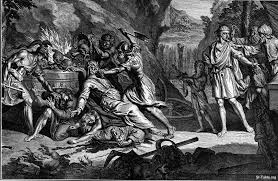 Now we go back to Kings 23:19, “And Josiah also removed all the houses of the high places which were in the cities of Samaria, which the kings had made provoking the Lord, and he did to them just as he had done in Bethel. And all the priests of the high places who were there, he slaughtered on the alters, and burned human bones on them; then he returned to Jerusalem.”
Now we go back to Kings 23:19, “And Josiah also removed all the houses of the high places which were in the cities of Samaria, which the kings had made provoking the Lord, and he did to them just as he had done in Bethel. And all the priests of the high places who were there, he slaughtered on the alters, and burned human bones on them; then he returned to Jerusalem.”
So again we see Josiah defiling the alters, by burning the bones of the very priests who had been sacrificing on them to false gods. The burning of human bones on an alter of worship, even an alter to false gods, was a defilement of that alter!
The Judgment of God
We need to understand what seems to me to be an important fact about all these examples of God consuming people with fire, and of God’s people destroying those who are ungodly. All these are really examples of God’s judgment! God has executed His judgment directly upon people, as an example to us of the results of unfaithfulness. And at times, God has authorized His faithful people, to execute His judgment upon the ungodly. Fire from heaven is a direct sign of God’s judgment. And when His people destroy the places of worship to false gods, and destroy the alters, with God’s approval, it’s also a sign of God’s judgment against these things. And the burning of the very bones of the ungodly, is a further sign of the utter destruction that those will suffer, who oppose God.
Now obviously, none of this is directly related to the practice that we call cremation. But I wanted you to see all that the bible does have to say, and the examples that are given, of the burning of human bodies and bones.
Conclusion
The conclusion of the matter is this.. There are simply NO examples in the bible of cremation, instead of burial, as a method of handling the dead. Now just because there’s no example of it, doesn’t mean that it’s prohibited by God. It simply means that it’s not a method mentioned in the bible. The bible neither directly approves nor disapproves of it. This is one of those occasions when after studying everything the bible has to say about a subject, we’re still left with the responsibility of making our own judgment. But our judgement does need to be based on the evidences that we have in the bible.
And so this is my judgment.. Since God is the creator of the human body, I believe that God wants us to treat it with respect. After all, while we are alive and in our bodies, God says, “Or do you not know that your body is the temple of the Holy Spirit who is in you, whom you have from God, and that you are not your own?” 1 Cor 6:19. But when we die, our body is no longer “the temple of the Holy Spirit”, because our body will then simply “return to the earth as it was”. (Eccl 12:7)
I would think that if Israel had done something inherently wrong, when they burned the bodies of Saul and his sons (1 Samuel Chap 31), that God would have condemned that action. On the other hand, a burial of some sort is the only example that we have in the bible, of respectfully handling the remains of the bodies of the deceased. Since we do have this example, and we do have the example of God Himself burying the body of His servant Moses, then we MUST conclude that this IS a “God approved” way to handle the dead.
But, is a “burial at sea”, or is a “cremation” AGAINST God’s will? We have nothing in His word to directly tell us that it is. I believe that when God leaves something up to our own conclusion, then THAT must be His will, that we conclude for ourselves, what is proper and what is not proper.
We still have the knowledge of God’s will, that He desires us all to be compassionate, and patient, and forgiving, and kind, and gentle, and respectful, and loving, and humble, and the list could go on. But as we reach our own conclusions about things that God has not specifically addressed, we need to USE all those attributes, that we know come from God, to guide us in our decisions. And we must also use all those attributes, in accepting our fellow man’s conclusions, especially when they differ from our own conclusions.
Two very important principles apply to every decision that we make during our lifetime. The first principle is this.. “And whatever you do, in word or deed, do all in the name of the Lord Jesus, giving thanks through Him, to God the Father.” Colossians 3:17 To do something in the name of Jesus, is to do it by His authority!
The second principle is this.. “You shall not add to the word which I am commanding you, nor shall you take away from it, that you may keep the commandments of the Lord your God which I command you.” Deuteronomy 4;2. If God’s word directs us to do a certain thing, then we must do it. If His word directs us to refrain from doing something, then we must refrain. And if God’s word leaves somethings up to our own discretion, then we must not attempt to legislate to others, what they must believe.
Isn’t God’s word simply great! If it says something, we do it! If it says not to, then we don’t! If it doesn’t say, then we base our opinions on all the principles that God has laid down for us, and allow all others to have their own opinions also. That’s not the wisdom of man, that’s the wisdom of God!
Coming up in our next post, will be an article about what God has authorized to be done concerning a “funeral ceremony”. I hope you’ll be interested in reading what God’s word says on the subject of “funerals”.
See you next time, and may God bless you in the study of His word.

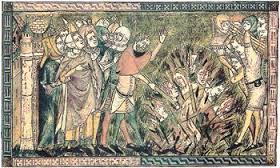

Jim, thank you for your thorough search of the scriptures re:the use of fire by pagans and by God’s people to destroy bodies. The question of cremation v burial is still unresolved for my husband and myself. We are old enough to be concerned that the popularity of cremation is just anothr sign of the general decline of “morality” in our American culture. I would never accept “God never condemns it” as the only reason for doing/not doing something, especially something that will have an efect on the minds and spirits of others. The question of does He approve, is He honored by it seems more important. Have you determined what you want your family members to do with your physical corpse? Do you mind giving your personal reasoning?
Hello Jean. Thank you for reading the article and thanks for your comments and questions. Let me begin by saying that I agree with you 100% when you say that you would never use the fact that God doesn’t offer a specific condemnation of something, as your ONLY reason for doing or not doing that certain thing. There is always much more that should shape our decisions besides that one fact. There are somethings that we must conclude are not acceptable to God, even though He has not specifically condemned them. One example of that has to do with the “ingredients” of the Lord’s supper. Since God has specified that we use unleavened bread and fruit of the vine, that fact alone tells us that no other food or drink items are acceptable. There shouldn’t be any question in anyone’s mind about that. When God specifies one particular thing, then that’s all that’s acceptable. But when there’s some action which must be done, such as the proper handling of the body of one who has died, and God has not specified exactly how that should be done, then we must use our own judgment, based upon the principles that God has revealed to us concerning our conduct and attitudes, and also upon the basic truths God has revealed to us. However, given all that God has revealed to us, and after taking all of that into consideration, some of us will still come to different conclusions pertaining to cremation. But just because we may have a different viewpoint that someone else, that doesn’t give us the right to try to legislate our view on some other person, because that would not be acceptable to God.
As for me and my wife, while we do not have anything in writing at this point, we have talked about simple cremation, and I believe that our son would be of the same mind. We personally see nothing at all with cremation, knowing that by God’s own design, the body will return to the earth from where it came, and therefore I believe that cremation is certainly not contrary to God’s design.
A very interesting article, and filled with biblical fact. I like how you present the Word in a relatively unbiased fashion and draw your conclusions in a humble way. As a thought, had you considered that the act of buring before burial could be a symbolism of “purification” of a corrupted or defiled being’s body before returning to the earth? I feel you are right, once an individual’s spirit has departed everything of spiritual substance is gone, however, the remains must return to the earth – which is God’s creation! Fire may very well represent a purification process of the defiled being returned to the earth.
Hi Andy. I thank you for your comment. And I think you may be right on target there, with the thought of the burning being a purification process. It would be interesting to delve into those practices from a secular source to see what is known. Many times we wonder about things that the bible doesn’t give us any information about. No doubt that information is not needed for our faith to be strong, but it is interesting nonetheless. Again, thank you for your insightful comments.